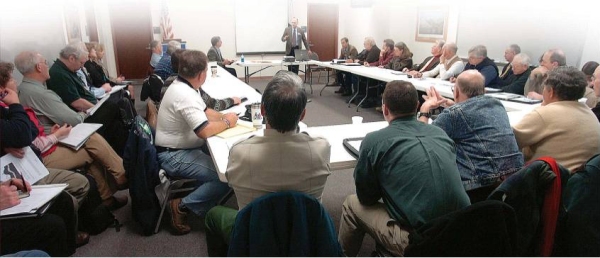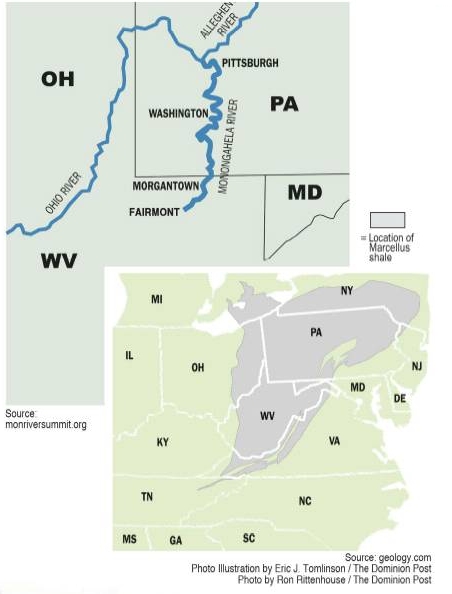
Morgantown Dominion Post
10 January 2009
By Cassie Shaner
THE ASSOCIATED PRESS contributed to this report.
The 4th Annual Monongahela River Summit — sponsored by the Morgantown Area Chamber of Commerce and the Upper Monongahela River Association — will be held April 13 at the Waterfront Place Hotel. A panel discussion about water quality will be part of the event. Info: monriversummit.org.
State and local officials indicated that water in the Monongahela River is safe, but they expressed concerns about how increased natural gas drilling in the Marcellus Shale might affect water quality in the future.
A forum held Friday on the river’s water followed news of an increase in total dissolved solids (TDS) — organic and inorganic minerals, salts, metals and other matter found in water — in the Monongahela River that affected drinking water in Pennsylvania last fall.

The Upper Monongahela River Association and the Morgantown Area Chamber of Commerce’s Mon River Recreation and Commerce Committee hosted a discussion with officials from the state Department of Environmental Protection’s Division of Water and Waste Management at the Morgantown Municipal Airport to address water-quality issues.
TDS found in the Monongahela River in Pennsylvania and West Virginia include sulfate from acid mine drainage and sodium and chloride found in waste water produced by Marcellus Shale drilling, according to information provided by the Upper Monongahela River Association.
The Marcellus Shale is a rock formation rich in natural gas deposits that runs beneath portions of Pennsylvania, New York, West Virginia, Ohio, Maryland, Virginia and Tennessee. The natural gas is costly to extract. Drilling typically involves blasting millions of gallons of water underground to release the natural gas locked in the deep rocks.

Patrick Campbell, assistant director of the state DEP’s Division of Water and Waste Management, said TDS are typically measured in milligrams per liter. Water in the Monongahela River leaving West Virginia and entering Pennsylvania in November measured about 500 milligrams per liter — the water quality standard for TDS in Pennsylvania. West Virginia has no established standard for TDS, Campbell said.
Jim Kotcon, of the state’s Sierra Club chapter, asked if the DEP plans to establish a TDS standard for West Virginia.
Campbell said it has been discussed, but officials are gathering information to determine the best course of action. A proposal would have to be developed and posted for comment by June in order for it be considered for approval during the 2010 legislative session, he said.
“It’s something that’s happening right now, so I can’t say whether we’ll have a proposal” this year, Campbell said.
Jim Green, general manager of the Morgantown Utility Board (MUB), said MUB carefully monitors organic and inorganic matter in the Monongahela River.
“We’re the first to know if there’s something going on in the water,” Green said. “We’re on top of this. We see TDS go up and down ... but as far as things that could affect your health, we’re on top of it.”
Green and Campbell said conventional water treatment does not improve TDS levels. Green said MUB would be interested in treating TDS if it was profitable, but reverse filtration, evaporation, crystallization and other high-cost water treatments must be used to reduce TDS.
“Many facilities would have to put in millions of dollars for treatment” if a TDS standard was created in West Virginia, Campbell said. “There would be resistance to that.”
Information provided by the Upper Monongahela River Association indicated that high TDS levels during periods of low water flow will worsen if mine drainage and drilling waste in the river increase.
But Scott Mandirola, director of the state DEP’s Division of Water and Waste Management, said oil and gas regulations prohibit drillers from discharging waste water from Marcellus Shale wells into surface water. They are required to instead put waste in underground wells designed to protect drinking water.
Wally Venable, of the Upper Monongahela River Association, said the increase in TDS levels can be attributed to “rogue operators” that do not follow the regulations and release waste water anyway.
“It only takes a couple wells ... to screw up some serious investments and lives and water supplies,” said Don Spencer, a councilman and deputy mayor for the city of Morgantown.
Spencer and Barry Pallay, chairman of the Mon River Recreation and Commerce Committee and vice president of the Upper Monongahela River Association, encouraged the DEP to take a comprehensive approach to preserve water quality in the Mon River.
“Unless we have higher standards for [each well], it seems we’re always going to be in jeopardy,” Spencer said. “We need to have higher standards in place to protect the natural capital that we all rely on.”
Bill Cannon, of Allegheny Energy, said stricter TDS regulations in Pennsylvania could cost the utility company as much as $61 million, and Pallay noted that TDS levels will eventually affect everyone in one way or another.
“It’s a Catch-22. There are serious consequences,” Pallay said. “We’re essentially still in the fact-finding phase, but we have to work together to get this done because it’s affecting all of us.”
Pallay said the Upper Monongahela River Association is looking to the state DEP to take the lead in addressing water quality issues, but Campbell said it’s hard to create a comprehensive plan for the Monongahela River basin that crosses states and regulations. A commission that covers the entire watershed might be a good idea, he said.
“That’s something we haven’t contemplated yet,” Campbell said.
Pallay indicated that Friday’s meeting was one of several ongoing discussions to address water quality concerns.
Campbell and Mandirola said they are still gathering information and learning more about how Marcellus Shale drilling will impact water quality. Pallay invited them both to participate in a panel discussion about water quality at the 4th annual Monongahela River Summit in April.